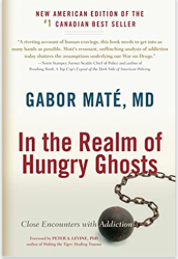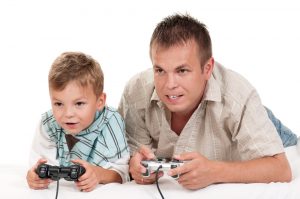Three Root Causes of Addiction

In The Realm of the Hungry Ghost, Dr. Gabor Mate, brilliantly and compassionately describes the plight of Vancouver’s hardcore drug addicts.
Drug addicts are society’s outcasts. With their difficult behaviors, and their tendency to lie or steal things to keep their addiction going, it’s tough to love and feel compassion for an addict.
But Dr. Mate eloquently reminds us, that far more of us are addicts than we realize. We might not want to identify with a drug addict, but if we reflect on our own habits, we might realize how hard it is to fight addictions. We can be addicted to a huge variety of things, including work, success, shopping, sex, screen time, coffee or a favorite food. An addiction is anything we have a compulsion to do, that we don’t feel like we have the ability to stop. How many of us are truly in control of our behaviors all the time?
Regardless of whether the addiction is considered acceptable or unacceptable by society, it often interferes with our relationships. Our significant other’s needs are often dismissed when we are in the middle of an addiction frenzy.
Why do so many of us struggle with addictions?
3 root causes of addiction
- Early childhood unmet needs:
Dr. Gabor Mate says that the roots of addictions lie in our unmet needs early in our childhood.
He describes his early life as a perfect example. For much of his life, he had loving parents who were able to provide for his needs. But he was born in Hungary in a Jewish ghetto during WWII. His father was in a forced labor camp, and his mother’s parent’s were killed in a concentration camp, shortly after he was born. His mother was struggling with depression, and they were under the constant threat of being shipped to a concentration camp. Before he was just a year old, he got so sick that he almost died, and his mom snuggled him out to be cared for by family friends. At that age, he had no way of understanding what was happening, and why he was being taken away from his mother. Dr. Mate confesses to suffering from workaholism and compulsive CD shopping.
While early childhood experience could be due to abuse, they can also be due to neglect or lack of parental attunement. Babies and toddlers need an extensive amount of love and support from their parents. They need their parents to help them feel safe, and to help them prepare for a world they are not prepared for. They need to feel understood, validated, valued, supported, and loved. Physical touch so important to an infant that they can die without it! If our parents are absent, have to work too much,  are mentally ill, suffer from addictions, or if they are not able to provide what they never received, this can hinder our ability to form healthy relationships. We often turn to addictions to satisfy the unmet needs that we had as young children.
are mentally ill, suffer from addictions, or if they are not able to provide what they never received, this can hinder our ability to form healthy relationships. We often turn to addictions to satisfy the unmet needs that we had as young children.
If you have an addiction, what unmet need(s) is it fulfilling?
- Addicted to our neurochemicals
People who are addicted to drugs like morphine, are obviously self-medicating. It is a way of supplying their brains with the neurochemicals that they have been sorely lacking. The problem with drugs however, is that if you do it too often, your body begins to develop a tolerance for the drug, and you need more and more to get the relief you are trying to achieve.
But we don’t have to take drugs to get addicted. We can do it with gambling, shopping or social media. Our brain craves those feel-good feelings when we get that dopamine hit, and that in turn makes us want to do it again.
Other neurochemicals that are associated with feeling good also include serotonin, endorphins and oxytocin. If we are lacking healthy ways to generate the neurochemicals, then we can be vulnerable to specific addictions that will meet those neurochemical needs.
- Inherited affects
 While there is no single addiction gene, we can have genes that render us more or less susceptible to addictions. But a genetic susceptibility is not sufficient to turn us into addicts!
While there is no single addiction gene, we can have genes that render us more or less susceptible to addictions. But a genetic susceptibility is not sufficient to turn us into addicts!
We now know that whether or not you’ve inherited a gene, what happens in your life, or what happened in your ancestor’s experience can determine how it is expressed. Since a gene can be expressed in thousands of different ways, there is a lot of potential to modify the expression of your genes in a healthy way!
Thus our ancestor’s experiences can render us more or less susceptible to addictions. If our parent was neglected, the feelings of neglect can be passed down epigenetically to determine how a gene is expressed. Often our emotions and beliefs determine whether your gene is expressed in a way that supports you or hurts you. That is why it is worth addressing the drivers of your genetic expression!
Are you struggling with addictions or obsessions? Are you ready to let them go? I use the Body Code to address the core needs and wounding, the neurotransmitter deficits, and the epigenetic expression of your genes. We also can address the challenges that interfere with emotional intimacy, or with having a meaningful, fulfilling and purposeful life. Clients have reported significant relief from their drives, and find it easier to choose healthy habits. They also have been able to keep and attract healthier relationships. If you are ready to have control over your own life, and to engage fully in what life has to offer, contact me for a complimentary consultation.



